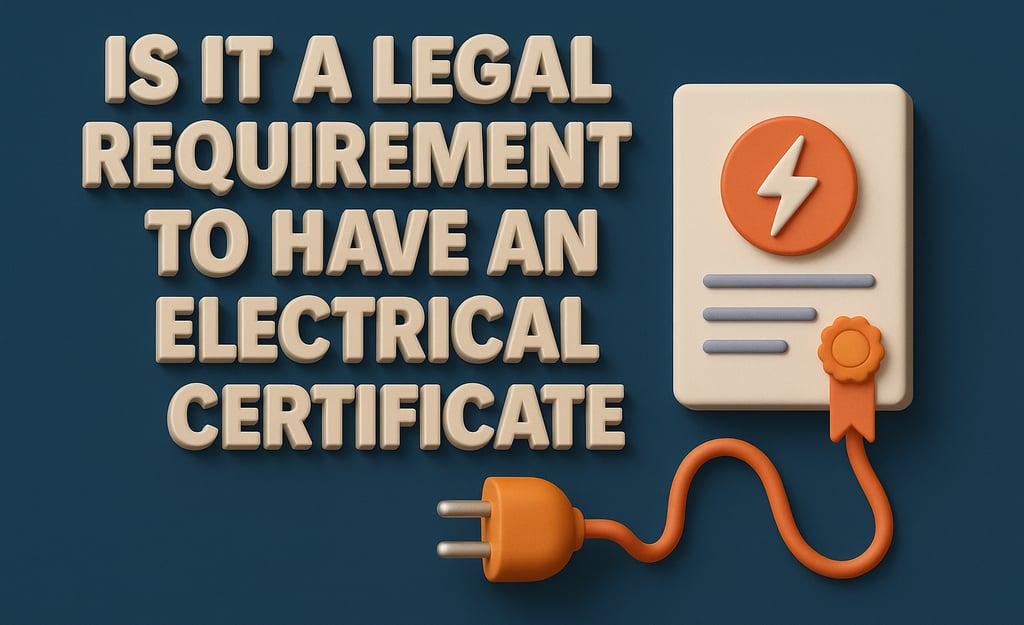Is it a Legal Requirement to Have an Electrical Safety Certificate?
All you need to know about EICR!
Rita Melody Cani
9/24/20253 min read


Is an Electrical Safety Certificate a Legal Requirement in the UK?
Here’s where things get interesting.
1. For Homeowners
If you own and live in your home, you are not legally required to have an electrical safety certificate. However, you are legally responsible for ensuring your electrics are safe.
That means if an accident happens due to unsafe wiring, you could be held liable. For peace of mind (and safety), many homeowners choose to have an EICR carried out every 10 years – or sooner if you notice any issues such as frequent tripping, burning smells, or buzzing sockets.
2. For Landlords (Private Rented Sector)
If you rent out property, it’s a different story. Since 1 April 2021, all landlords in England (and similar rules across the UK) are legally required to have a valid EICR for their rental properties.
Key points landlords need to know:
A full electrical inspection must be carried out at least every 5 years.
A copy of the report must be provided to tenants, new tenants, and the local authority if requested.
Any “unsatisfactory” findings must be remedied within 28 days (or sooner if specified).
Landlords who fail to comply risk fines of up to £30,000.
So yes, for landlords, having an electrical safety certificate is a legal requirement.
3. For Businesses & Commercial Properties
If you run a business, you have a duty of care under the Health and Safety at Work Act 1974 to keep staff, customers, and visitors safe. While there’s no single law saying “you must have an EICR,” in practice, regular inspections are required to demonstrate compliance with workplace safety laws.
Insurers also often demand proof of electrical inspections. Without an up-to-date certificate, a claim could be rejected.
4. When Selling a House
Legally, you don’t need an EICR to sell your home. But having one can make the process smoother. Buyers and solicitors often ask for electrical safety evidence, and a valid certificate can speed up the sale or even make your property more attractive.
How Often Should Electrical Safety Checks Be Done?
Here are the recommended intervals for EICRs in the UK:
Homeowners: Every 10 years, or at change of occupancy.
Landlords: Every 5 years, or at change of tenancy.
Businesses: Every 5 years, though some environments (factories, workshops) may require inspections as often as every 3 years.
Special Locations (swimming pools, caravans, medical areas): Every 3 years or less, depending on risk.
What Happens During an Electrical Safety Inspection?
A qualified electrician will:
Check the consumer unit (fuse board).
Test circuits for faults.
Inspect sockets, switches, and light fittings.
Assess earthing and bonding.
Look for overloaded systems or dangerous DIY work.
At the end, you’ll receive one of two outcomes:
Satisfactory – Your electrics are safe.
Unsatisfactory – Remedial work is required, usually coded as:
C1 (Danger present) – Must be fixed immediately.
C2 (Potentially dangerous) – Needs urgent attention.
C3 (Improvement recommended) – Not immediately dangerous, but should be improved.
What if You Don’t Have an Electrical Safety Certificate?
Homeowners: You’re at risk of hidden dangers, costly faults, or invalid insurance claims if something goes wrong.
Landlords: You could face hefty fines and be barred from renting until the certificate is provided.
Businesses: You risk legal action, invalid insurance, or even closure if someone is injured due to unsafe electrics.
So while not everyone is legally obliged to have one, the risks of skipping an EICR far outweigh the cost.
How Much Does an Electrical Safety Certificate Cost in the UK?
The cost varies depending on property size and number of circuits. As a ballpark:
1–2 bed flat: £150–£250
3–4 bed house: £250–£350
Large property / commercial building: £400+
Prices also depend on whether the electrician charges per circuit or a fixed fee. Always check that the electrician is registered with a recognised body such as NICEIC, NAPIT, or ELECSA.
How to Tell If Your Property Might Need an Inspection
Even if you’re not legally required, book an EICR if you notice:
Lights flickering or dimming randomly.
Frequent tripping of the fuse board.
Burning smells from sockets.
Buzzing or sparking switches.
Outdated wiring (e.g., old rubber or lead cables).
These are signs your system could be unsafe.
The Bottom Line
Homeowners: Not legally required, but strongly recommended every 10 years.
Landlords: Legally required every 5 years – no exceptions.
Businesses: Required to comply with workplace safety laws and insurance.
Selling a Home: Not required, but can smooth the process.
An electrical safety certificate isn’t just a piece of paper – it’s peace of mind that your family, tenants, or employees are safe.
If you’re in Harrogate or the surrounding areas and need an EICR, get in touch with Jet Power & Light.
📢 Looking for an electrician in Harrogate? Call Jet Power & Light on 07983 580149 or visit www.jetpowerandlight.co.uk!
Jet Power & Light Ltd
Reg.No. 13868909
Jet Power & Light Commercial Ltd
Reg.No. 14733526
VAT Reg.No. 438393761.
Address: 9 Meadow Gate, Harrogate, HG1 3LJ
Registered Office Address: Horley Green House,
Horley Green Road, Halifax, HX3 6AS
COPYRIGHT © 2022 JET POWER & LIGHT LTD - ALL RIGHTS RESERVED.
